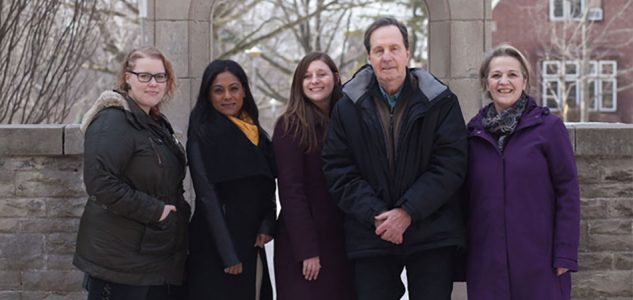For the love of qualitative data

Conference organizers from left to right: Jennifer Hounsell, Department of Sociology, Malanie Dani, Social Psychology Program, Deana Simonetto, Department of Sociology, William Shaffir, Department of Sociology, Dorothy Pawluch, Department of Sociology and Director of the Social Psychology Program
April 7, 2017
Some researchers work with numbers and graphs, looking for correlations and statistical significance. Others ask questions that relate more to the lived experiences of social actors – how individuals construct meanings and experience the social realities they inhabit. Data can look different for these researchers. Data can take the form of detailed notes produced as a participant observer in the milieu or group being studied or transcripts from naturalistic interviews and conversations with people in those settings. Data can also take the form of journal entries, tweets, website content, news accounts, narratives, autobiographies, cartoons, photos. Any materials that have the potential to help understand some aspect of the human condition are grist for the mill of qualitative researchers.
This May, qualitative researchers from around the world will be meeting as McMaster University hosts the 34th Qualitative Analysis Conference (QAC). The conference will include close to 200 paper presentations from researchers from over 18 countries representing over 40 disciplines.
“It’s wonderfully exciting to be hosting the QAC”, says Dorothy Pawluch, Director of McMaster’s Social Psychology Program and conference organizer along with William Shaffir of the Department of Sociology.
“Especially since this is where the conference first started 34 years ago.”
Pawluch explains that McMaster’s Department of Sociology is widely recognized for having played a key role in developing qualitative research in Canada over the past 50 years. “It seems fitting,” she pointed out, “to have older and younger generations of sociologists and other qualitative researchers coming together like this, here and now, to reflect on our roots and consider new directions for the future.”
This year’s theme The “Glorious Triumph” of Symbolic Interactionism: Honouring the Past/Forging the Future, reflects the contributions that interpretive theories, especially symbolic interactionism, have made to the development of qualitative research and on the importance of linking theory and methods.
Among the papers to be presented are those that address challenges in doing qualitative research, including how to work with visual materials, the relationship between observer/observed, researcher/participant, and ethical dilemmas that can arise. Other papers will present the findings of qualitative studies in areas as diverse as policing, illness experiences, cyber risk, deviant subcultures, race/ethnic relations and doing gender.
The keynote address, After Terrorism, will be delivered by David Altheide, Regents’ Professor Emeritus in the Faculty of Justice and Social Inquiry at Arizona State University. Dr. Altheide, well known for his work on media and the construction of discourses of fear, will discuss the recent Trump victory and Brexit. Also featured will be a talk, Through Thick and Thin: On Ethnographic Explanatory Critique, by Dr. Sam Hillyard, Reader in Sociology at Durham University, UK.
The conference, funded in part by a SSHRC Connection grant, will be hosted by the Social Psychology Program and Department of Sociology at the Sheraton Hamilton Hotel in Hamilton, May 17-19, 2017. Day passes are available for those interested in attending select sessions or talks, and undergraduate students can attend for free. Please visit www.qualitatives.ca for registration and program details.

